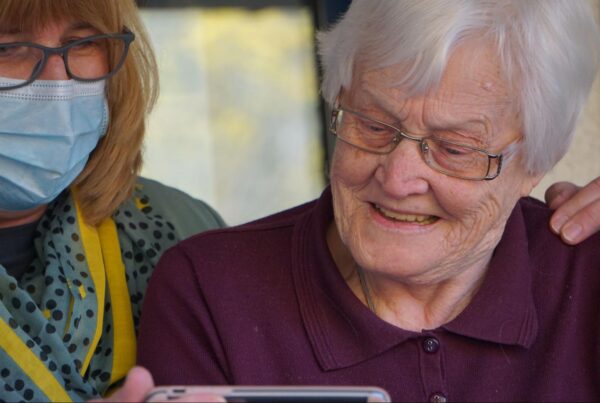Key Takeaways:
- Social media helps seniors combat loneliness by facilitating regular communication with family and friends.
- Engaging with social media platforms can enhance cognitive function and provide emotional support for older adults.
- While beneficial, it’s essential for seniors to navigate social media mindfully to avoid misinformation and privacy issues.
How Does Social Media Impact Senior Well-being? Social media positively impacts senior well-being by reducing feelings of isolation through enhanced connectivity with loved ones and communities. It offers cognitive stimulation via interactive content and discussions, and provides platforms for emotional support through shared experiences and online groups. However, seniors should approach social media cautiously to protect personal information and discern credible information sources.
The Impact of Social Media on Senior Well-being: Staying Connected in the Digital Age
The rise of social media has transformed how people communicate, share information, and maintain relationships. While younger generations may have led the charge in adopting these platforms, seniors are increasingly discovering the benefits of staying connected in the digital age. For older adults, social media offers opportunities to combat isolation, access information, and engage with their communities. However, navigating these platforms also comes with challenges, including privacy concerns and misinformation.
At Advanced Care, we recognize the powerful role social media can play in improving senior well-being when used thoughtfully. In this blog, we’ll explore the benefits of social media for seniors, discuss potential risks, and share tips for making the most of these digital tools.
The Growing Presence of Seniors on Social Media
Social media platforms like Facebook, Instagram, and WhatsApp are no longer the sole domain of younger generations. In recent years, there has been a notable increase in social media use among seniors. According to a Pew Research Center report, nearly 45% of adults aged 65 and older now use at least one social media platform, a figure that continues to grow as more seniors embrace digital connectivity.
This shift reflects the adaptability of older adults, who are using social media to reconnect with old friends, stay in touch with family, and engage in activities that promote lifelong learning. As seniors become more comfortable with technology, these platforms provide a valuable way to enhance their quality of life.
The Positive Impact of Social Media on Senior Wellbeing
1. Combating Social Isolation
One of the most significant benefits of social media for seniors is its ability to reduce loneliness and isolation. Many older adults live far from family members or have limited opportunities for in-person interactions due to mobility issues or health concerns. Social media bridges this gap, allowing seniors to communicate regularly with loved ones through video calls, messaging, and shared posts.
Seniors who engage with social media often report feeling more connected to their communities and less isolated. Platforms like Facebook make it easy to join groups based on shared interests, creating opportunities to build new relationships and rekindle old ones.
2. Enhancing Cognitive Engagement
Social media encourages seniors to stay mentally active by interacting with content, reading articles, and participating in discussions. Engaging with digital platforms can provide cognitive stimulation that supports memory retention and critical thinking. For example, learning how to navigate new apps or contribute to online conversations challenges the brain in ways that promote mental agility.
Platforms like YouTube offer seniors a wealth of educational content, from cooking tutorials to historical documentaries, allowing them to learn new skills and explore their interests. This ongoing engagement can enhance cognitive health and overall satisfaction.
3. Providing Emotional Support
The ability to share life updates, photos, and videos on social media fosters emotional connection and support. For seniors facing challenging situations, such as chronic illness or the loss of a spouse, these platforms provide an outlet to express feelings and receive encouragement from their networks.
Online support groups are another resource that can be particularly valuable for seniors. Communities focused on topics like caregiving, health conditions, or hobbies offer a sense of belonging and understanding that can be deeply comforting.
4. Encouraging Physical Activity
While social media is often associated with sedentary behavior, it can also be a motivator for physical activity. Fitness influencers and virtual exercise communities share workout tips, yoga routines, and wellness challenges that inspire seniors to stay active. Platforms like Instagram and TikTok feature easy-to-follow videos tailored to different fitness levels, encouraging older adults to move their bodies and prioritize their health.
5. Fostering Intergenerational Relationships
Social media bridges generational gaps by creating a shared space where seniors and younger family members can interact. Grandparents can follow their grandchildren’s milestones through posts, photos, and videos, fostering closer relationships despite physical distance. For many families, social media becomes a tool to strengthen bonds and create lasting memories.
Challenges of Social Media for Seniors
1. Privacy and Security Concerns
One of the primary challenges seniors face on social media is understanding and managing privacy settings. Sharing personal information publicly can expose users to identity theft, scams, or unwanted solicitations. Seniors may also struggle with recognizing phishing attempts or fraudulent messages.
2. Exposure to Misinformation
Seniors, like other users, are vulnerable to misinformation and fake news on social media platforms. These misleading posts can lead to confusion or misinformed decisions, particularly regarding health and wellness topics. Ensuring that seniors can critically evaluate information is essential for their digital safety.
3. Technology Barriers
For some seniors, navigating social media platforms may feel overwhelming due to unfamiliarity with technology or physical limitations, such as poor eyesight or reduced dexterity. These barriers can discourage older adults from fully engaging with social media, limiting their ability to reap its benefits.
4. Social Comparison and Negative Impacts on Mental Health
While social media can foster connection, it can also lead to feelings of inadequacy or loneliness when seniors compare their lives to the curated highlights of others. Seeing others’ achievements, travels, or family celebrations may inadvertently contribute to feelings of exclusion or dissatisfaction.
Tips for Seniors to Stay Connected and Safe on Social Media
1. Learn the Basics
Taking the time to learn how social media works can build confidence and reduce frustration. Seniors can attend workshops at community centers, watch online tutorials, or ask family members for guidance. Understanding features like privacy settings, blocking, and reporting inappropriate content is key to a safe experience.
2. Set Clear Boundaries
Encourage seniors to limit their time on social media to avoid overuse or feelings of overwhelm. Setting specific times for checking updates can create a balanced routine that doesn’t interfere with other activities, such as hobbies or exercise.
3. Prioritize Privacy
Help seniors review and adjust their privacy settings to control who can view their posts and personal information. Teach them how to recognize phishing scams and avoid clicking on suspicious links. Emphasize the importance of not sharing sensitive information, such as financial details, on public forums.
4. Follow Trusted Sources
Encourage seniors to follow reputable sources for news and health information, such as official government agencies, healthcare organizations, or trusted media outlets. Fact-checking tools like Snopes or FactCheck.org can also help verify the accuracy of shared content.
5. Join Positive Communities
Guide seniors toward groups or pages that align with their interests, such as gardening, travel, or cooking. Positive online communities foster a sense of belonging and offer opportunities to make meaningful connections.
6. Engage with Family Members
Family members can help seniors navigate social media and stay connected. Encourage younger relatives to include seniors in group chats, share updates, and celebrate milestones together. These interactions create a shared digital space for intergenerational bonding.
Maximizing the Benefits of Social Media for Seniors
When used mindfully, social media can be a powerful tool for enhancing senior well-being. It allows older adults to maintain relationships, discover new hobbies, and access valuable information. By addressing potential risks and equipping seniors with the skills to navigate platforms safely, families can ensure that their loved ones enjoy the benefits of digital connection without unnecessary stress.
At Advanced Care, we’re committed to supporting seniors in every aspect of their lives, including their digital journey. Whether it’s helping seniors learn new skills or fostering community connections, we’re here to enhance their quality of life. If you or a loved one would like assistance in exploring the digital world safely, contact us today to learn more about our services.






